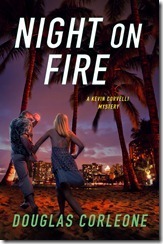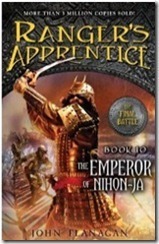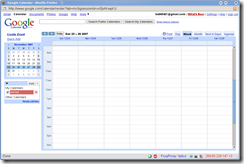Elizabeth Spann Craig's Blog, page 206
May 6, 2011
Taking Names
 I was in Anderson, SC, on Friday morning, visiting my parents after talking to the Sisters in Crime's Greenville chapter on Thursday night.
I was in Anderson, SC, on Friday morning, visiting my parents after talking to the Sisters in Crime's Greenville chapter on Thursday night.
My mother likes to listen to a local talk radio show in the mornings. I didn't pay any attention at all to it, so it was a sort of white noise in the background for me as I read the newspaper.
Suddenly my mother turned up the volume a little. "Let's see what Pork Chop has to say," she said, under her breath.
"Excuse me?" I asked. "What did you say?"
"I said that I wanted to listen to Pork Chop."
"His name is Pork Chop?" It was hard to wrap my head around.
"Well, that's what he goes by."
Yes, I am a Southerner. Yes, there are names like Pork Chop here in the Southern US. I come across them all the time. They are not made up. You can't make stuff like this up.
I also come across amazing names almost every day—first names and surnames. I got a truly incredibly surname the other day from someone who emailed me. I added it to my collection. I love my name collection Word file. Some of the names immediately evoke a particular image.
Sometimes? I get caught.
"Is that my name in your book?" I'll be asked.
Well, it's a name they share with the character, I'll tell them. Sometimes I can't even remember where I collected the name….TV? Radio? Newspaper? An acquaintance mentioned the name?
And I need a lot of names in my books. There are five suspects. There's a sidekick and a sleuth and various supporting characters. Some characters make return appearances in books…some don't. I always need fresh names for each book.
One thing I always make very, very clear---the characters are not the people whose names are used. I always make a point that they're nothing like the character. Because people wonder…if I used their name, what else did I borrow?
Do you borrow names? Do you have a name collection like I do? How do you handle it if you use the name of someone you know?
**************
[image error]Sign up for the free Writer's Knowledge Base newsletter and be automatically entered in a June drawing to receive K.M. Weiland's CD (or MP3) Conquering Writer's Block and Summoning Inspiration CD. (Current subscribers will also be entered.) The newsletters include top writing articles, blogger spotlights, and interviews with industry insiders. Sign up here: http://hiveword.com/wkb/newsletter. (You can unsubscribe at any time, and your email address is never shared.)
May 5, 2011
More Help for Restless Writers
 A little over a month ago, I wrote a post about being a restless writer.
A little over a month ago, I wrote a post about being a restless writer.
In it, I admitted that I'm a writer that has a hard time sitting still for very long. I sort of wince whenever I hear about writers with incredible discipline who sit for hours and write. I just can't do it for that long.
Right now I have a lot of writing going on….actually I have several different deadlines. One is for a manuscript, one is for a full outline, one is for edits. So I really need to knock out a lot of work (and my apologies in advance if I'm not quite as active online for the next 1 1/2 months.)
In the last post on this topic, I mentioned some different ways I approach writing as a restless writer:
Do other writing-related tasks if you're in a time crunch or under deadline. This is especially helpful for me. I can get work done that I've got to get done, but I can switch to writing the outline if I'm tired of writing, or switch to editing if I'm restless with the outline, etc.
Open up to the possibilities of writing on the go during the day. Write in dead time while waiting for something, write in my head as I do errands, write at a library.
Move around. Doing housework while writing is an easy multitasking win…because housework requires no thought. Somehow, it helps me brainstorm, too.
And:
Reduce up front the amount of time you're writing before taking your breaks. Consider writing in 15 minute segments.
More on that last one now. I've read an interesting post on the Work Awesome blog about the Pomodoro Technique. This technique is incredibly simple to remember because there are only 5 steps:
Pick a task you need to accomplish. Set a timer for 25 minutes and start working When the timer rings, take a 5 minute break Repeat steps 1-3 Every four cycles, take a 25 minute break.Since I'm feeling a little under the gun right now, I followed this technique yesterday with the full 25 minute cycles and it worked really well. Ordinarily, though, I think I'd probably reduce the 25 minutes to 20 or possibly even fewer.
I think it would still be effective if the amount of time in the cycle is reduced, because you're still in the writing zone. I think the hardest part of working on that cycle is at the beginning, when you're just getting started for the day.
One additional note on the technique above—as a restless writer, I found that during my 5 minute break (step 3), I needed to do something really active that was not on the computer. I spent that time loading or unloading the dishwasher, folding a few pieces of laundry, packing the children's lunch for the next day…you get the idea.
During the 25 minute break after 4 cycles were completed (step 5), then I checked social media (email, Twitter, etc.) Because it's very, very tough to pull away from social media after only 5 minutes, but it can easily be done in 25 with a timer.
How do you eliminate distractions to focus on your writing? Or does it come naturally to you?
May 4, 2011
Subtle Ways to Come Out of the Writing Closet
 It can be difficult (and some writers feel, impossible) to out yourself as a writer to friends, family, and neighbors.
It can be difficult (and some writers feel, impossible) to out yourself as a writer to friends, family, and neighbors.
It shouldn't be that hard. I don't see plumbers, doctors, vets, or carpenters having the same problem.
But I totally understand this reluctance. For years, I wouldn't introduce myself as a writer when people asked what I did for a living. I'd label myself a mom or a stay-at-home mom. I'm usually uncomfortable meeting people for the first time, and I don't like to any focus attention on myself.
For me, though, it got to the point where it was ridiculous not to mention it. I found that if I didn't mention my writing, then people didn't understand why I couldn't volunteer every day at the school (I still volunteer a lot there), or why I couldn't talk on the phone for long periods of time during the mornings. Or why I'd disappear into my house around deadlines and not be seen out.
When I finally did talk openly about being a writer, some people I knew were upset that I hadn't mentioned it earlier. I think they thought it showed a lack of trust on my part.
It's usually the fear of not knowing the reaction that the other person is going to have when you say you're a writer. I think I've now heard about every reaction there is—from interest to disbelief to boredom. There are some questions that are inevitable: What types of books do you write? Are you published? Do you write under your own name? How many books have you written?
Let's say that you do want to let people know that you're a writer. How can you subtly reveal you're a writer?
An email signature. Got an ebook out? A printed book? Articles to link to on the web? A writing blog? You've got plenty of material for a simple email signature that automatically goes out on any email you send.
Bookmarks or business cards. Many writers I know use online printers like VistaPrint to order inexpensive business cards. When an acquaintance or neighbor asks you for your phone number or email address, you can hand them your card and scribble your personal info on the back. (When I've done this, I've almost never gotten questions about my writing right then. The person usually looks a little taken aback and then asks about my writing the next time I see them.)
Write an article for the community newspaper with a writing tagline at the end. This is a great way to make a little extra cash (and I do mean little) and have a tagline at the end of the story for anyone in the community to see. The freebie community mags are wonderful for that kind of thing (and always need material) and everybody seems to read them at the coffee shop, etc. I've had a few people mention my writing to me for that reason.
Got a traditionally printed book? Have a signing…and mention it on Facebook. This is a very public way to announce you're a writer, but if nothing else works, this will. Your friends will assume that they just weren't somehow paying attention when you mentioned your writing around them.
Give talks in local schools. Teachers love it if you speak to their classes about how exciting writing is…especially if you ask them how they're approaching teaching writing and you can follow their curriculum in your talk. A few parents of the children I spoke to in the elementary school mentioned weeks later that their kids had enjoyed my talk.
Actually telling people. When they ask you what you do, say you're a writer. Because that's what you are. A writer isn't only someone who has a book on a shelf. A writer writes.
Ultimately, talking about my writing not only made my life easier but it also got me some new readers.
Do you openly talk about your writing to others? When did you decide to do so?
May 3, 2011
Being Prepared—as a Writer
 Sunday I was feeling less than prepared.
Sunday I was feeling less than prepared.
I'd been super-prepared all week—meeting every challenge that came my way…anticipating challenges in advance. But boy, I was sure dropping the ball all day Sunday.
Sunday afternoon, my son volunteered with other middle school kids at a car wash to raise money for camps for inner city children. Great cause! I brought him there, dropped him off, and took off home.
He ended up soaking wet in a chilly wind. I came back and brought him towels and a change of clothes. Left again and returned later to pick him up.
Took my daughter to another event Sunday afternoon. This one I actually thought a little bit about. "Sweetie," I said, "it says 'gross games and gross food' on the invitation. You're wearing really pretty clothes. Are you sure you don't want to change?"
She didn't. And I thought about bringing a change of clothes for her in the car (just in case), but we were running behind (and I'm never late), so we jumped in the car.
When we got there and she saw there were games involving spaghetti, shaving cream, and slime, she asked me for old clothes. I drove home, got the clothes, and came back again. Then left and came back again to pick her up.
When it was all said and done, I made 10 total trips up and down the same road on Sunday. It should only have been 6. Lots of wasted time because I didn't think ahead.
It's good to be prepared as a writer, too. It can keep us from getting too discouraged and quit something that we could end up being successful at. It can also keep us from wasting time on tangents.
Some areas to be prepared for:
Be prepared that new ideas that seem wonderful will strike right when you're mucking through difficult terrain on your current manuscript. Jotting them down in a Word file for future reference can keep you from getting sidelined.
Be prepared that the siren song of the internet or the omnipresent smart phones will lure you away from your book. Closing all windows or writing on paper when you're feeling especially susceptible can help.
Be prepared that there will be spots in your WIP when you're not sure how you'll move the story forward or make the character come alive. Brainstorming solutions or making lists of as many possibilities as you can dream up is a good way to handle it.
Be prepared for doubt because all writers have it (or they should have it). We all wonder variations on this theme: is this story any good? Will anyone want to read it? Will someone want to publish it or am I wasting my time? Is all this trouble worth it? During these times, it's good to spend time with other writers…either online or in person…for support.
Be prepared for bits of dead time with paper and pencil.
Be prepared for the research and time that goes into querying—and the seemingly endless rejections. On the upside, there is tons of information out there on which agents are looking for what type of material, how to construct a query, and what to include in one.
Be prepared to have an online presence or platform if you're planning on being either traditionally published or self-published.
Be prepared to promote and to think up new ways to reach your readers. Publishers put most of this responsibility on the writers. If you don't enjoy appearances, you can opt for social media promo, instead.
Be prepared for good and bad reviews.
Be prepared to feel conflicted about different writing strategies, promo strategies, and publishing options.
What things have you discovered about writing that it's good to be prepared for?
*********
[image error]Sign up for the free Writer's Knowledge Base newsletter and be automatically entered in a June drawing to receive K.M. Weiland's CD (or MP3) Conquering Writer's Block and Summoning Inspiration CD. (Current subscribers will also be entered.) The newsletters include top writing articles, blogger spotlights, and interviews with industry insiders. Sign up here: http://hiveword.com/wkb/newsletter. (You can unsubscribe at any time, and your email address is never shared.)
May 2, 2011
Rejection is Murder—by Douglas Corleone
 My path to publication was fairly typical, which is to say that it was littered with near-misses and heart-wrenching rejections. So how does a writer fight through it all? Unfortunately, there is no easy answer. But I can tell you what's worked for me.
My path to publication was fairly typical, which is to say that it was littered with near-misses and heart-wrenching rejections. So how does a writer fight through it all? Unfortunately, there is no easy answer. But I can tell you what's worked for me.
One. Toss the rejections the moment you receive them. Note them in your submissions log, then rip them to shreds. They serve no useful purpose.
Two. Each time you receive a rejection, make another submission. Tweak your query letter, revise your manuscript, whatever you think it takes. But get your story out there again.
Three. Keep writing. Never sit around, waiting for a "yes." Always be working on your next project. Because chances are, your next project is going to be better than your last.
Four. Treat writing as a business. The simple fact of the matter is that you have a product to sell. Whether it was made in Taiwan or created with your own blood, sweat, and tears, it's still simply a product. If your product's not selling, improve it or manufacture another product.
Five. Never take rejections personally. They're going to feel personal, at least initially. But you need to develop a thick skin, especially if you do plan on being published. Because that's when the reviews start trickling in.
Six. Never set time limits. It's fine to have goals, but you cannot control the speed of the publishing industry, and the fact is, the publishing industry moves at glacial speed. By giving yourself two or three years to get published, you'll be doing yourself a disservice.
Seven. Be career-oriented. Always see the big picture. Your goal shouldn't be to publish one book but to build a career. After all, that's what agents and publishers are looking for. With this in mind, rejection becomes somewhat useful. You don't want to debut with anything but your best work, because bad reviews and low sales figures can kill an author's career. And you don't want to have to start the entire process all over again, under a different name.
Eight. Never take yourself too seriously. This advice goes for both aspiring writers as well as established writers.
Nine. Patience, persistence, resilience. These may sound trite, but they really are the keys to getting published.
Ten. Improve your writing. You should never stop learning, never quit honing your craft, whether you're a debut novelist published by a small, independent press, or a New York Times Bestseller. Don't be embarrassed to pick up books on writing – none of us know everything. And as for what we do know, we can always use a refresher.
If none of the above work, grab a drink and kick back with a good mystery. Might I recommend my debut novel ONE MAN'S PARADISE, or my latest release NIGHT ON FIRE. Until next time, happy writing.
***************
Thanks so much for posting today, Douglas! Douglas writes the Kevin Corvelli mysteries for St. Martin's Minotaur. His 2nd novel in the series, Night on Fire, released April 26. He's on Twitter: @douglascorleone.
A trailer for NIGHT ON FIRE can be found on YouTube at http://www.youtube.com/watch?v=Gs9K1tlPFGw
May 1, 2011
When to End a Series (When It's Up to You)
 I've mentioned before that I have a tough time keeping my teenage son in books. He reads quickly, he's always reading, and he's a picky reader. It's tough.
I've mentioned before that I have a tough time keeping my teenage son in books. He reads quickly, he's always reading, and he's a picky reader. It's tough.
One of his favorite series is the Ranger's Apprentice series. He reads all the books in John Flanagan's series over and over again.
Finally, on April 19th, there was a new release in the series. I'd preordered the book and got it as soon as it was available. Unfortunately, as I was ordering it, I saw that the book (book 10 in the series) marked the end of the series. The author was embarking on a new series, which is to launch in the fall.
Apparently, I shouldn't have told my son that he was reading the final book in the series. He kept saying, "Mom, all I keep thinking about is that this is the last book! Why would he do that? Aren't the books selling?" (He's pretty aware of the importance of sales, with a mom in the biz.)
The series is a New York Times bestselling series…poor sales isn't the reason. I'm sure that Penguin/Philomel would probably be delighted to publish as many books in the series as John Flanagan wanted to write.
I tried to find an online interview with Flanagan to find his reason for ending the series, but couldn't find one. I decided to placate my son by telling him the reasons that I could imagine that an author would want to end a popular series (most times the publisher wants to end a series, not the writer). To my son, it was like he'd lost his fictional friends.
I don't know why John Flanagan ended his series, but I can imagine reasons that authors decide to call it quits:
The characters have all been completely explored and there's not much more room for growth.
The author wants to finish the series while it's still popular.
Possible storylines during brainstorming sessions don't seem as sound or interesting as previous ones (quality control).
Lack of inspiration or new direction.
Wanting a new challenge, new setting, and new characters to explore (boredom…or just an exciting new idea that won't let go.)
What are your thoughts on when series should end? If you're writing a series, what would make you end a series and start a different project?
*********
[image error]Sign up for the free Writer's Knowledge Base newsletter and be automatically entered in a June drawing to receive K.M. Weiland's CD (or MP3) Conquering Writer's Block and Summoning Inspiration CD. (Current subscribers will also be entered.) The newsletters include top writing articles, blogger spotlights, and interviews with industry insiders. Sign up here: http://hiveword.com/wkb/newsletter. (You can unsubscribe at any time, and your email address is never shared.)
April 30, 2011
Twitterific

![Terry3_thumb[1]](https://i.gr-assets.com/images/S/compressed.photo.goodreads.com/hostedimages/1380447585i/1701687.png)
Below are writing links that I've posted to Twitter in the last week.
The Writer's Knowledge Base search engine designed by software engineer and writer Mike Fleming, makes all these links searchable—try it for searches on POV, writing description, making smooth transitions, and more.
[image error]Anyone signing up for the Writer's Knowledge Base newsletter this month (and current subscribers) will be automatically entered in a June drawing to receive K.M. Weiland's CD (or MP3) Conquering Writer's Block and Summoning Inspiration CD
The WKB newsletter always includes top writing articles, blogger spotlights, and interviews with industry insiders? Sign up for the free WKB newsletter here: http://hiveword.com/wkb/newsletter . (You can unsubscribe at any time, and your email information is never shared.)
Don't Call Me Ishmael—Name that Character: http://bit.ly/ikabm7
How to Edit with Efficiency: http://bit.ly/ihieo6
Need tips for plotting? http://bit.ly/fiTDIR
Putting Your Schedule on a Diet: http://bit.ly/kIFeRe
How to Become a More Self-Disciplined Writer: http://bit.ly/lMDfY7
6 Ways to Add Vibrant Partnerships to your Author Platform: http://bit.ly/lSDINw
The 5 Stages of Writing a Book: http://bit.ly/kOX51u
How to speak publisher - B is for Book: http://bit.ly/j4W6xa
The Truth About Blogging: http://bit.ly/lccK95
The Rejection Numbers of 14 Famous Writers: http://bit.ly/iuqOCk @LauraMarcella
A writer reflects on her ebook experiment & why it wasn't as successful as she'd hoped: http://bit.ly/jAzcf1 @camillelaguire
Bruce Coville's Eight Tips for Fantasy Writers: http://bit.ly/lhmNbp
The "Villain" Spectrum: Creating a Layered Antagonist: http://bit.ly/jQ3FrC
Published more than one book? Expectations your readers may have: http://bit.ly/jzSRju
Myst. Lov. Kitchen: An easy breezy brunch for any weather! http://bit.ly/mwJoGB @CleoCoyle
Getting to Know You: http://bit.ly/lFFv9H
The Ever-Popular I Suck Playlist: http://bit.ly/lfygQ9
Facebook groups for screenwriters: http://bit.ly/ioRcsK @galleycat
3 Tips to a Successful Audio Interview: http://bit.ly/lTuOzZ
Creativity Tweets of the Week — 4/29/11: http://bit.ly/jHunaq
3 Tips for Capturing the Teen Voice: http://bit.ly/l0y1ma
How to make your story unputdownable: http://bit.ly/kxC97x
Sign up for the monthly WKB newsletter for the web's best writing links and interviews: http://bit.ly/gx7hg1
Visual Tools for Writers: http://bit.ly/m7Nj1z
Best Articles This Week for Writers 4/29/11: http://bit.ly/jB1lSF @4kidlit
Keep your query short: http://bit.ly/jh4MYU
Every scene needs at least 3 reasons for being there: http://bit.ly/kPVMuo
Character Development 101 for crime fiction writers: http://bit.ly/kZKme3
Write Fast: http://bit.ly/mC6sxG
Too distracted to write? The internet isn't to blame--you are (PW): http://bit.ly/ljMMId
7 Formats for Winning Blog Posts: http://bit.ly/lZY98U
Real Life Diagnostic: Am I Showing or Telling? http://bit.ly/l8rWx8
Using Your To-Do List as a 2nd Brain: http://bit.ly/k5PCbi
Avoid 10 Common Screenwriting Mistakes: http://bit.ly/kQbgwt @galleycat
One Never Knows, Does One? http://bit.ly/jf8C3y
Poems for a wedding (Guardian): http://bit.ly/eKIh5f
Myst. Lov. Kitchen: Step Away from the Microwave! http://bit.ly/je9ZfD @CleoCoyle
Do You Have a Muse? http://bit.ly/jphalA
Writing When You Don't Have Time: http://bit.ly/l7luqx
Beware the Adjective Trap: http://bit.ly/lOKYct
6 Common Slip-Ups that Make Your Blog Look Bad: http://bit.ly/lCWFDX
5 Ways to Tell if It's The ONE: http://bit.ly/iv8LDU
5 Articles on the Differences Between Middle Grade and Young Adult: http://bit.ly/k07Kj6
Everyone Wants to "Help" Writers. But Whose Help Do You Really Need? http://bit.ly/jWBFyW
Query: Things you can leave out of your first paragraph: http://bit.ly/iBPk7T
The EASY Way to Do Facebook In 15 Minutes a Day: http://bit.ly/iW1KCg
Strengthening Dialogue: http://bit.ly/l8sRYq
How to Write Thousands of Words Every Single Week: http://bit.ly/iKsZFq
Pros and cons and dos and don'ts for the BEA: http://bit.ly/m9Ljdv
Cousin Its: http://bit.ly/k3UrzI
A writing thesaurus (new entries for weather): http://bit.ly/kYqv9y
The Interminable Agency Clause: http://bit.ly/iBv3Fo
How do you know if you should write a sequel? http://bit.ly/lzuepD
How Deadlines Can Help Your Writing: http://bit.ly/iP0CJ6
Magical Words, Windows, and Doors: http://bit.ly/j7zPc2
Do You Need Two Spaces After a Period? http://bit.ly/jW1jNt
Truth in Blurbing: http://bit.ly/iTt9x8 @mkinberg
Pacing tips: http://bit.ly/fsnZDM
Myst. Lov. Kitchen: SAY CHEESE, AGAIN...in one week http://bit.ly/jgcJjv @CleoCoyle
Build a platform by being a blogger booster: http://bit.ly/kX7MBj
20 Classic Novels You Can Read in One Sitting: http://bit.ly/ib6QWt
A writer I am: http://bit.ly/eR14S3
Time Period Settings: http://bit.ly/kQF0PA
Keyboard Shortcuts and Other Amazing Productivity Tips: http://bit.ly/l75dGS @jhansenwrites
Editorial chat on revision: http://bit.ly/iJR5Si
A New Way to Find Critique Partners: http://bit.ly/lb3uiO
Unless it moves the heart: http://bit.ly/lO0754 @lauradroege
8 Things To Keep In Mind When Naming Characters: http://bit.ly/lV6Mhf
Want this month's most popular writing articles? Sign up for the monthly WKB newsletter for links & interviews: http://bit.ly/gx7hg1
How to Book a Reading: http://bit.ly/jPMPUs
5 Common Writing Problems and How to Fix Them: http://bit.ly/gsNYRy @thecreativepenn
6 keys to making your reader believe in everything you say: http://bit.ly/k4oB2v @nicolamorgan
How to Regain Control of Your Schedule: http://bit.ly/dN6kZn
3 Rude Thoughts For Aspiring Writers Of Speculative Fiction: http://bit.ly/hS00IS
5 Book Interior Page Layout Mistakes to Avoid: http://bit.ly/gqz6R4
Art for art's sake? http://bit.ly/jVqwhA @agent139
The ellipsis: http://bit.ly/gEq7rA
Flirtation, mean jokes, and some observations on humor: http://bit.ly/eHwB8L
One, Two Three, Notice Me: The Rule of Three: http://bit.ly/gseJUd
What were this month's most popular writing articles? Sign up for the monthly WKB newsletter for links & interviews: http://bit.ly/gx7hg1
Marketing 101: Loving & Taking Care of Our Readers: http://bit.ly/heATre
Spring cleaning from page 1: http://bit.ly/eNj3HH
Fiction vs. Nonfiction E-Book Pricing in the Kindle Store: http://bit.ly/gC1PDV
Move through the creative gap: http://bit.ly/hmcmNM
Choosing Our Path–Genre Matters: http://bit.ly/eQGlph
I'm Not an Expert, But I Play One On the Internet: http://bit.ly/hPp8BT
Myst. Lov. Kitchen: Got Leftover Ham? Ham Casserole! http://bit.ly/i9oeXK @CleoCoyle
How Twitter Can Make You A Better Copywriter: http://bit.ly/hFYzoo
"To Be," or Not "To Be" Verbs? http://bit.ly/e2kszP
Coping with False Starts: http://bit.ly/ikhPKx
Suspense. Where does it start? http://bit.ly/fOAfqo
Cut words? Or add words? http://bit.ly/hwS0I2
The Department of Redundancy Department: http://tinyurl.com/6fftjza via @DWDavisRSL
Softening a main character: http://bit.ly/fvBvNp
On Agency Agreements: http://bit.ly/hBtJfx
Avoid The Obvious In a Query: http://bit.ly/ecan5h
Back to Basics: Submitting Our Work: http://bit.ly/ess67t
The query quandary: http://bit.ly/fl61Ze
Is your book's setting ho-hum? http://bit.ly/gByyLa
Put Your Flabby Writing On A Diet: http://bit.ly/ha4QVf
The 3 Basic Aspects of Showing-Not-Telling: http://bit.ly/hqjUgv @victoriamixon
Why You Got Rejected: http://bit.ly/euHGf0
Writing from Your Character's Point of View: 5 Guidelines: http://bit.ly/fVESvI
Publishing myths that both writers and publishers cling to: http://bit.ly/e2lup2 @agent139
Use Archetypes to Create Literary Characters: http://bit.ly/dJLZdJ
Design Characters using Mind Maps: http://bit.ly/dNNGHG
"10 Reasons I Can't Write Right Now:" http://bit.ly/eD1Rki @elspethwrites
Author Blogs – Use Categories to Organize Your Posts: http://bit.ly/fVg5TD
On apostrophes: http://bit.ly/eT08is
Strategies for Adapting Your Novel to a Screenplay: http://bit.ly/f4blzj
Writers do more than write: http://bit.ly/dGVItH
On women, writing, and time: http://bit.ly/dT2dt8
Myst. Lov. Kitchen: Easter Egg Salad and More Tasty Ideas for Your Holiday Leftovers from Cleo Coyle http://bit.ly/dJ2rvS @CleoCoyle
Don't let this happen to you! 1)Procrastination, 2) writing binge, 3) axe murder: http://bit.ly/efraVM
5 Ways to Publish a Book for iPad, iPhone, and iPod: http://bit.ly/dXpv0A
Why writers must embrace social media, no matter their genre (Guardian-Edinburgh) http://bit.ly/hYPR7U
Marketing for Writers: 8 Weeks to Social Marketing Domination: http://bit.ly/e1frFL
The craft essay on why you shouldn't trust craft essays: http://bit.ly/i9Vqkf
Head-hopping headaches: http://bit.ly/el50pK
Best Tweets for Writers (week ending 4/22/11): http://bit.ly/fDaqJ3
What Bloggers Need to Know About Trademark Law: http://bit.ly/gtAb1y
Writer's Block—Real or Imaginary? http://bit.ly/eqyOf9
Why Joanna @thecreativepenn supports the 99 cent price point for e-books: http://bit.ly/hhjn0B
How to make your most ordinary scene interesting: http://bit.ly/gUGV0j
Researching for Your Novel: http://bit.ly/gakpy4
Search my tweets-- http://dld.bz/KPgS
"I'm a Poet. Yes, That's a Real Job." (Wall St. Journal): http://on.wsj.com/heDzVt
5 Crippling Beliefs That Keep Writers Penniless and Mired in Mediocrity: http://bit.ly/etZljn
Key Story Elements - Inciting Incident: http://bit.ly/gyWOE9
Reasons for writers to carry business cards (especially at conferences): http://bit.ly/gl8QXw
What Is a 50-Page Edit… and Why Will It Rock Your Story? http://bit.ly/hfrZjg
How to be a good editor: http://bit.ly/gwTKpR
Spring cleaning (and organization) for your social networks: http://bit.ly/g3EFXl
The Tricky Territory of Publishing Blogs: http://bit.ly/hCUoRf
Resources for writers--Literary Marketplace: http://bit.ly/efGhHJ @spunkonastick
How hard is it to sell a short spec script? http://bit.ly/fWNnyW
Time management tips: http://bit.ly/h46anr @authorterryo
3 Reasons Why Failure is the Key to Success: http://bit.ly/gzV35d
6 Signs You're Not Ready To Make A Living As A Professional Writer: http://bit.ly/i8BIhL
10 Parody Novels That Get the Last Laugh: http://bit.ly/gzoucg
Myst. Lov. Kitchen: Gambas al Ajillo with Pasta http://bit.ly/f4OOG7 @CleoCoyle
9 Reasons Successful Freelancers Abroad Get a Real Job First: http://bit.ly/gpDG3L
Building believable relationships in romantic fiction: http://bit.ly/dYhgTv @gone_writing
How Your RSS Feed Can Save Your Blog: http://bit.ly/gRGW9n
3 Ways to Market Your Book to iPhone Users: http://bit.ly/exXqBi
Revising a Series: http://bit.ly/eHs8Yc
Can Twitter Really Help You Sell Books? http://bit.ly/h7sMeR
How to format your comic book script: http://bit.ly/eji9UP
Time Management for Writers–Getting More Done in Less Time: http://bit.ly/eJNVqy
The varying degrees of theme: http://bit.ly/dJM1v4
51 Reasons Why You Are A Creative: http://bit.ly/i4lPRL
10 Ways Authors Sabotage Themselves: http://bit.ly/dUYdWO
Top 20 Facebook Apps for Book Lovers: http://bit.ly/gueH9Z
Top 10 Ways to Get Your Creative Juices Flowing: http://lifehac.kr/f0XyZF
Writers--in your contract, you promise you're not lying or plagiarizing: http://bit.ly/gQ7PqK #amrwiting @literaticat
What were this month's most popular writing articles? Sign up for the monthly WKB newsletter for links & interviews: http://bit.ly/gx7hg1
Seeking Representation through Roundabout Routes: http://bit.ly/g5aAGQ
The Comfort of Bad Reviews (That Aren't Yours): http://bit.ly/hz4twi
Research -- Looking at Other Art Forms: http://bit.ly/dJbSg5
A well-rounded manuscript--characters and plot: http://bit.ly/g3hEmM
Why writing is like baseball: http://bit.ly/hqIDNu
5 fundamental practices that keep you from writer's block while you're writing a book: http://bit.ly/hujMLL
5 Essentials For a Story Starter: http://bit.ly/eU1JcV
Living in deep head space: http://bit.ly/ifgDqr
6 Tips to Writing a Killer Author Bio: http://bit.ly/g6wCSD
3 Ways to Add Meaningful Structure to Your Writing Life: http://bit.ly/h0Dg4j
How brevity can crush your copy: http://bit.ly/fNtpWq
Best Articles This Week for Writers 4/22/11: http://bit.ly/hR7gF6 @4kidlit
Why Ask Why? Because Your Readers Will: http://bit.ly/eZPnKt
Creativity Tweets of the Week — 4/22/11: http://bit.ly/fsWkOO @on_creativity
5 things 1 writer has learned from recent writing conferences: http://bit.ly/i6KhHK
April 29, 2011
Making Progress on Our Manuscripts (and Other Things)
 There are times when I get a sense from writers of huge progress being made on manuscripts. NaNoWriMo (in November) is one of those times.
There are times when I get a sense from writers of huge progress being made on manuscripts. NaNoWriMo (in November) is one of those times.
Then there are times when I hear writers are struggling (holidays, summer travel time.)
Honestly, there's just never a good time to write a book. Life is busy, writing involves quiet reflection…it can be hard to fit that time in.
But since there is no good time to write a book, you might as well write yours now. :)
Jane Friedman had a great post last week on Writer Unboxed on adding structure to your writing life.
I especially like Jane's advice about making a weekly and daily goal. She has a link for a free download for a goal sheet. One thing I like about the goal sheet is that it acknowledges that there are impediments to reaching that goal and makes you list them so you recognize them in advance.
I also completely agree with Jane's advice on naming specific tasks to accomplish. For me, the more specific I can be, the quicker I can make my goal. Instead of listing "finish next scene," I'll say: "have sleuth question witness, write setting description for the local park, make sure motivation for sleuth's actions is clear," etc.
The only thing that I might change a little is that instead of 30-60 weekly, dedicated minutes (which admittedly might work for many), I'd say 5-10 minutes a day, whenever they can be snagged, for those who just can't find that 30-60 free minutes in their weeks currently. To write only 5 minutes a day, you do need to be slightly more organized and know what you're planning on knocking out that day (don't spend your five minutes rereading what you wrote the day before.) At least you're making daily progress.
How do you stay on task during busy times?
April 28, 2011
Using Google Calendar to Stay Organized
 Right now I'm using two tools to keep my calendar organized. I really had to do something new because I suddenly had a ton of stuff going on—book club meetings, a library talk, guests on my blog, my guest posts on others' blogs…plus the usual dental appointments, the children's events, family/friend birthdays, etc. I was waking up at night worrying that something was going to fall through the cracks.
Right now I'm using two tools to keep my calendar organized. I really had to do something new because I suddenly had a ton of stuff going on—book club meetings, a library talk, guests on my blog, my guest posts on others' blogs…plus the usual dental appointments, the children's events, family/friend birthdays, etc. I was waking up at night worrying that something was going to fall through the cracks.
What's really working for me right now is using 2 different methods—the old-fashioned wall calendar method plus Google Calendar.
The reason Google Calendar is working so well for me is because I have a smart phone that syncs to that calendar. So I have the calendar with me at all times. I have to admit that it's really nice. When someone asks me if I'm free to do something on a particular day, I don't have to say, "Can I check my calendar and call you back?" It's just so nice to open the calendar on my phone and check the date and save myself a phone call (I'm no fan of talking on the phone anyway.)
Another really, really nice thing about using Google Calendar (particularly if you can sync it to your phone) is that I can copy/paste from different emails right into the calendar.
For example, say I've got an email for an event of some kind (writing-related or personal). The email might list things that to bring with me to the event, might give directions to the venue, might have the time the event starts and stops. I just select all, copy, and paste it to the corresponding date on the Google Calendar. Then I've got it right there, easily accessible on both my laptop and my phone.
Or it might be an interview request. Lately I had a couple of different blog interviews. The questions were in the body of the email. I pasted the email into the date on my calendar that I needed to turn it in…and set reminders for earlier. Several times when I was out and I had dead time waiting for something, I took out my phone, read the questions, and jotted down answers to email later on my always-handy notebook.
You can also share your calendar out with someone else. Not that that other person might read the calendar like intended. :) But it is nice to know that, if somehow I went missing (I'm a murder mystery writer, so these thoughts are always in the back of my head), that my calendar could be accessed to see where I was supposed to be.
My wall calendar is really needed, too—it's best for spotting potential conflicts on the calendar. Sometimes I just have to see it all laid out on paper. My wall calendar is posted on my garage door where I have to see it when I go in and out of the house.
What are you using to stay organized? Do you use Google Calendar or something else?
April 27, 2011
Publishing Myths
 Publishing is a changing world and it stands to reason that writers and publishers who are adaptable have a much better shot at survival than those who aren't.
Publishing is a changing world and it stands to reason that writers and publishers who are adaptable have a much better shot at survival than those who aren't.
But how should writers and publishers adapt? One way, I think, is by realizing there are industry myths that might cause them to make poor choices.
Hope you'll pop by James Curcio's blog, Modern Mythology, for my look at publishing-related myths.



